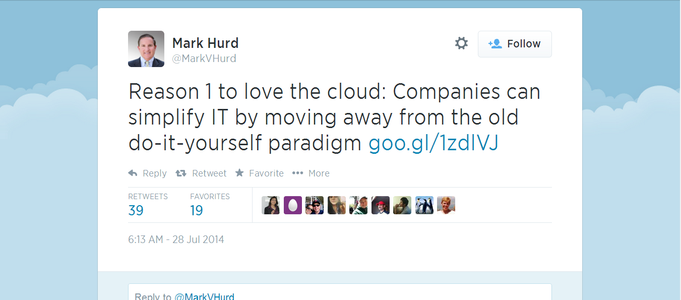Oracle may be a relatively long-lived firm by tech company standards, but the company has its feet planted firmly in the future. The company’s head honchos are placing a bet on the cloud as the future of computing. President Mark Hurd and founder/CEO Larry Ellison increasingly are dropping all the tech giant’s chips on decentralized cloud computing strategies. Here’s the how and why.
Tweeting Up a Storm
Ellison and Hurd have not been shy about letting the world in on their new love, either. Mark Hurd’s Twitter account, in particular, frequently testifies to the new strategy. Here’s an excerpt:
Image via Imgur
Note the “reason one” tag: Hurd has published more than one cloud-loving Tweet, linking to a video presentation, with more presumably on the way. Also note the evangelical language. Hurd isn’t saying that we should use cloud solutions as an intelligent strategic component; he’s saying we should treat it like a welcome member of the family.
Larry Ellison, meanwhile, after some initial reservations, has dived into the deep end of the cloud pool. In a recent statement made during an earnings conference, he promised Oracle will be competitive on every level of the cloud. Clearly, Ellison’s commitment to this new strategy is unwavering.
Appetite for Decentralization
Oracle’s cloud-focused approach doesn’t end at idle tweets and conference calls. In the past several years, the tech giant has been gobbling up smaller firms doing innovative work in the field, from Nimbula to RightNow. This has enabled Oracle to offer customers dozens of cloud productivity solutions, from word processing to databases to spreadsheets. At the same time, Oracle has begun scaling back on its Sun server hardware line, moving its primary assets and expenditures into the software business. After years of change, Oracle appears to be moving back to its roots, de-emphasizing hardware and instead concentrating on making great programs.
Binary History
The focus on software is not new to the company. Oracle began with Larry Ellison’s software; the company name stems from a CIA database project Ellison worked on. Over the years, Oracle has carved a niche for itself as a provider of business-focused programs. The acquisition that led to the Sun server line was itself an outgrowth of this logical progression; if Oracle was selling software to an increasingly networked business environment, why not sell them their servers as well?
Evolving Markets
One important fact about the move away from servers needs noting: rather than roll back the entire line, Oracle has moved away from the lower-powered end of the spectrum, focusing on higher-end customers. Thus, the move can be seen as more of a refocus on core competencies in reaction to marketplace changes than a full-on retreat. The core of the Oracle business model has always been great software, whether that software is installed locally, housed on a nearby server, or floating in the greater internet.
U.S.S. Enterprises
The main focus of Oracle’s cloud shift has been toward enterprise-level businesses and the IT solutions needed by these businesses. Enterprises, as multi-tiered business endeavors, can suffer if their components are unable to properly integrate; networked software solutions are thus critical to their operation. Cloud software, therefore, is less an entirely new phenomenon and more of a progression from existing models, allowing greater flexibility for companies in the current business environment.
Cloud paradigms like Software as a Service, Platform as a Service, and Infrastructure as a Service allow enterprise businesses, already taxed by the burdens of multifaceted coordination, to gain flexibility in IT. SaaS makes interoffice work a breeze and compatibility concerns a thing of the past, PaaS allows in-house development without in-house development costs, and IaaS grants fluidity to the raw processing power of a company. The three combined paradigms make cloud computing a no-brainer for this growing business model. Oracle’s newfound affection is therefore entirely practical, putting the company where it needs to be to continue to service its clients.
As indicated above, Oracle (and Mark Hurd) may be in love with the cloud, but it is a healthy and well-advised affair. Careful positioning on this new frontier puts Oracle in a position to maintain its dominance going forward. And that’s something to Tweet about.











